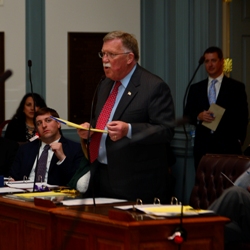Delaware Casino Relief Bill Introduced as Revenues Plummet

Delaware’s online gambling market generated a tiny $2.4 million in revenues for the whole of 2017, with that figure representing a steep 18% decline compared to the previous year. By comparison, New Jersey with a population of 9 million people, or almost ten times that of Delaware (952k), generated online gambling revenues more than a hundred times that of its southern neighbor.
In light of the woeful annual result, members from both sides of Delaware’s political divide have been pushing to provide assistance for the state’s three beleaguered casinos. As a result, State Sen. Brian Bushweiler (D-Dover) has now introduced Senate Bill 144 which aims to provide relief to the industry by slashing tax rates, as well as disposing of its license fee.
Double-Digit Revenue Drop
Last year, Delaware’s online gambling revenues amounted to a mere $2.4 million, with video lottery games (slots) accounting for $1.6 million of that tally, or 10% lower versus the segment’s performance in 2016. In the meantime, online table games noted an even sharper 28% year-on-year decline to $600,000, while online poker revenue plummeted by 48% to $231,000.
Delaware launched its regulated internet gaming market in 2013, with Delaware Park, Dover Downs, and Harrington Raceway subsequently being granted licenses to offer their online products in the state. Hugely inflated forecasts at the time resulted in unrealistic tax rates being imposed on their operations, though, while the casino industry as a whole currently pays 43.5 percent of all its revenue in taxes.
Needless to say, this leaves little money for casinos and their online sites to offer attractive bonuses and promotions in order to attract fresh customers. Consequently, Delaware has seen its online poker revenues shrink by 61% since the product was first offered, with the shared online poker liquidity deal agreed between Nevada and Delaware in 2015 having done nothing to stem the decline.
In fact, a look at the WSOP NV/DE Lottery network on PokerScout reveals an average of just 140 cash game players over a seven day period, with a 24 hour peak of 277 players.
New Jersey to the Rescue?
There may be some good news ahead for the state’s beleaguered online poker industry, though, as last year New Jersey also agreed to join their shared player network. New Jersey made the decision despite years of resisting calls to do so by these other regulated states as it, too, has seen its online poker market spiral downwards.
After all, while New Jersey’s online gambling market generated revenues of $245.6 million last year, or 24.9% higher than in 2016, online poker, on the other hand, accounted for only 10% of that amount. Furthermore, online poker revenues were down by 8% compared to 2016, and only 2% higher than the worst total ever recorded in 2015.
When Pennsylvania finally launches an online gambling market of its own sometime this year, it is subsequently expected to join the shared network, which should provide a further boost to the industry as a whole. This then could result in a snowball effect as more and more states are encouraged to adopt legalized online gambling markets of their own, and throw in their lot with an increasingly coordinated and organized industry.
Casino Relief Bill
In the meantime, Delaware legislators have now introduced a bipartisan bill in order to provide some desperately needed relief for the state’s casinos, and as its sponsor State Sen. Brian Bushweiler (photo) explains:
“The casino industry pays all the same taxes as any other business in Delaware. You pick a tax and they’re paying it … but in addition to it, through the first three quarters of 2017, Dover Downs paid $56 million between the horse racing industry and the state.”
The introduction of Senate Bill 144 represents the third such attempt in three years to provide aid for the state’s casinos, with this version proposing that the high tax rate of 43.5% be applied only to revenues above $225,000, with the following rates applied to lower revenues; less than $75,000 (32%), $75,000 to $150,001 (35%), $150,000 to $225,001 (37.5%).
In addition, the tax rate applied to table games would be cut from 29.4% to 15%, while the $13.25 million price tag attached to a table game license that all three casinos share between them would be dropped completely. The immediate impact of the bill would be to slash revenues to the state coffer by $21 million, but more importantly it would also help preserve some of the 1,401 jobs currently provided by the industry.
Nevertheless, significant hurdles would first have to be overcome before any bill is eventually accepted, and as Sen. Bushweller explains:
“I will say that it’s been clear to me over the past two or three years, an increasing number of members of the General Assembly have come to understand the issue and I think want to try to do something about it. Whether we can do something depends on a lot of other factors.”







